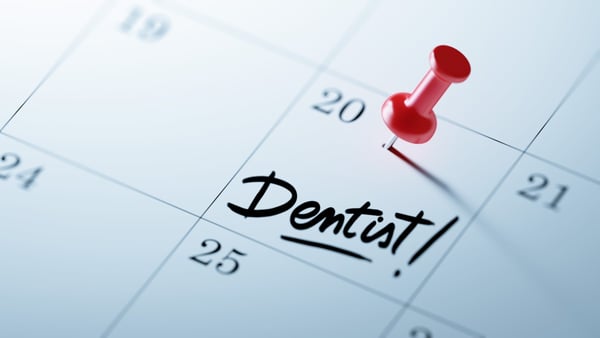Using Patient Education Videos to Support Preventive Care Strategies
As a healthcare provider, you know prevention saves lives. From routine screenings and lifestyle counseling to vaccinations and early detection,...
5 min read
Robert McDermott Mar 9, 2023 12:00:00 PM
 A car without a steering wheel? A boat without a rudder? A bike without handlebars? That reads of chaos, an inability for riders to get where they’re going under control, if even at all. For your practice, it’s probably how you feel about your morning huddle. The day can quickly go off course if everyone isn’t on the same page. And, for your patients, that’s a treatment plan. Without one, it’s difficult to plan ahead and see the steps you, and your staff, will need to take to get your patient to the best oral health possible.
A car without a steering wheel? A boat without a rudder? A bike without handlebars? That reads of chaos, an inability for riders to get where they’re going under control, if even at all. For your practice, it’s probably how you feel about your morning huddle. The day can quickly go off course if everyone isn’t on the same page. And, for your patients, that’s a treatment plan. Without one, it’s difficult to plan ahead and see the steps you, and your staff, will need to take to get your patient to the best oral health possible.
Now consider an additional daily resource that focuses on the analytics of treatment plans and other patient factors. You’re not hiring more staff, instead you are utilizing cloud-based revenue analytics software to automatically do a data deep dive for you, providing short and long term looks at optimizing revenue opportunities. Let’s dig into dental treatment plans and the technology that can turn those plans into a revenue-generating playbook.
Quick Links
A dental treatment plan provides an outline of services, both preventative and restorative, in the sequence they should occur to improve a patient’s oral health. It offers a holistic view of recommended treatments, when they should be scheduled, and what insurance will cover to provide those services.
Because they are tailored for individual patients, they can help address both short and long term issues. Further, the sequence and recommended treatments are designed to prevent problems from happening (preventative) and address existing issues (restorative) before they become bigger. That makes them particularly important for both patients and dentists who are trying to understand and schedule the care needed while also factoring in the financial impact.
 Why are Dental Treatment Plans Important?
Why are Dental Treatment Plans Important?Any time there’s an end goal, like better oral health, having a plan to get there is essential. Even if it’s a simple one and involves standard preventative care like cleanings, it’s beneficial to both your dental practice and the patient.
For dental patients, treatment plans are invaluable. While they provide an excellent opportunity for patients to be educated regarding their current oral health and the services you’d like to schedule, they provide even more value than that.
First, a treatment plan can help patients schedule their care. With busy schedules and overloaded calendars, just setting aside time for self care, especially when it comes to health, is something many people struggle with. Getting a date on a calendar can serve as a powerful reminder to prioritize their oral health and increase the chances they’ll get the scheduled treatment.
Additionally, with a tight schedule between work, family, and other commitments, making a last minute appointment is often difficult (and frustrating). A dental treatment plan helps people schedule around their needs, especially if everyone is clamoring for a lunchtime dental appointment.
Further, regularly scheduled appointments for care can help prevent existing conditions from worsening, and becoming more costly, while also improving preventative care.
Finally, for many patients, whether there is a high deductible or an insurance plan that doesn’t cover, in part or full, the treatment you recommend, knowing in advance that a service is recommended can help a patient plan financially.
For dental practices, a dental treatment plan offers many of the same benefits including educational opportunities and improving scheduling. However, when it comes to revenue and cash flow, patient recall is a significant indicator of practice health.
Patient recall, for cleanings and preventative care, checkups, and follow ups help you plan and prepare for income and revenue streams. And, when patients are scheduled in advance, it also improves patient retention, another indicator of practice health.
Further, a treatment plan, and the pre-scheduled appointments that come along with it, are a remarkable time saver for your administrative staff. Appointments scheduled to align with existing treatment plans means no phone calls to schedule and the ability to avoid the administrative tasks that go along with that process (looking up insurance information, checking accounts receivable, and possibly more).
In short, while dental treatment plans improve patient care and retention, they also improve office efficiency and profitability.
Creating a dental treatment plan takes time and, given the benefits noted above, is worth the effort. You’re ensuring a patient gets the dental care they need and you're ensuring ongoing practice health as well. But, what happens when patients aren’t keeping up?
Remember when we said one of the advantages of a treatment plan was to help improve administrative staff efficiency? That benefit can disappear pretty quickly if they have to spend time discovering whether a treatment plan exists, whether the patient has signed on, and tracking down other vital information like insurance benefits, scheduled appointments, missed appointments, and whether payment is owed on previous treatments.
Ensuring dental treatment plan adherence can help all that. Dental plan adherence means a patient is scheduling and attending the planned treatments or services. Potentially, that becomes just one more thing your staff needs to track.
That is unless you’ve got iCoreAnalytics, the dental practice analytics software from iCoreConnect.
 How Dental Practice Analytics Can Improve Dental Treatment Plan Adherence
How Dental Practice Analytics Can Improve Dental Treatment Plan AdherenceYou meet with staff daily to discuss the schedule, patients, and procedures planned for the day. This meeting ensures that everyone is on the same page regarding what tasks need to be handled and to address any known or expected challenges. But there is more information about patients, ‘lost’ revenue, goal-setting and goal-attaining than you are most likely accessing. This is where you want to add specialized revenue analytics software to your team. There are a variety of analytics options on the market that offer limited benefits. However, if you want to maximize revenue and productivity, you need a software resource that specializes in the metrics that matter most to moving your practice forward.
iCoreAnalytics revenue analytics software puts your practice data, the day’s schedule, and patient data right at your fingertips. For example, one of the primary missed revenue opportunities at dental practices is a lack of treatment plan adherence. In other words, a treatment plan was made and presented to the client, it was accepted, but never completed. Those uncompleted treatment plans can leave a lot of revenue on the table. iCoreAnalytics identifies those lost revenue opportunities, so your team can take action to claim it.
Imagine if, in one simple dashboard, you could view your practice’s progress towards its revenue goals, its missed revenue opportunities, and match those up with the day’s schedule to discover which patients need to be scheduled for their next treatment, which patients have missed scheduled appointments, and which patients need to make payments. In short, you can balance what the day’s potential revenue is against the month’s projected revenue. The software aggregates the other touch points to help you identify the gaps that can either cause you to fall short or help you to far exceed the potential.
All of those elements are like an electrical circuit that powers your practice. If one element is missing, you risk not providing the power, or revenue, you practice needs. And, rather than digging in multiple places to find where the process is interrupted, wasting time and energy, iCoreAnalytics can help you:
The type of software you choose matters. You need the convenience of all of the data in one dashboard. You need data to be straightforward and, frankly, understandable the first time you see it. You need certain goal and revenue information to be only accessible to you as the owner or manager. This is all accomplished with iCoreAnalytics. You can also take advantage of retention building opportunities with a recent patient list that lets you make quick connections and follow up calls easily. The best part? Because it’s cloud based, your team can access the data from anywhere. Everything you need to grow is delivered in an easy to use interface, on a platform that lets you tailor that data to your needs, whether it’s by patient or by your daily schedule.
Practice analytics no longer need to feel overwhelming or time consuming. Book a demo with the iCoreConnect team today to discuss how iCoreAnalytics can improve your efficiency while ensuring you don’t leave revenue behind.

As a healthcare provider, you know prevention saves lives. From routine screenings and lifestyle counseling to vaccinations and early detection,...

There’s no denying that the AI boom is here. The American Medical Association reports that 66% of physicians are currently using artificial...

If only managing your practice’s revenue cycle came with a crystal ball. You could spot claim denials before they happen, predict when patients might...

What keeps you from digging into the numbers and analytics at your practice on a regular basis? We all know the data can help grow business, but we...

Data. Your practice is gathering it daily. But with required tasks, patient care, customer service, and other demands of a busy dental practice,...

Nearly every dental practice and DSO out there wants to boost revenue. In fact, many practices are still working to recover from a nearly 18% drop in...